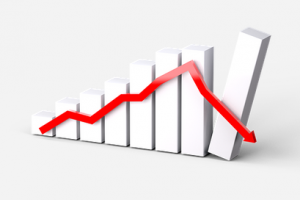Hedge funds. They're supposed to be the best of the best when it comes to stock-picking, or whatever type of trading each one specializes in. They certainly get paid well enough to give rise to such an expectation, not only collecting a fee for their work, but sharing in some of the net profits – if any – they may produce.
The reality is, however, while some of these funds may do what they're supposed to do and beat the market regardless of the environment, a shocking number of them consistently underperform. When things get really squirrely, some are even squeezed out of existence.
That's what happened to James Cordier earlier this month. After making some now-ill-advised bets on oil prices at least not sinking, his fund – and its (presumably accredited) 290 shareholders – lost pretty much everything after Cordier rode the crude oil meltdown he didn't see coming.
You may know Cordier. He's the author of the book called 'The Complete Guide to Option Selling,' and the operator of a website called optionselling.com. His fund was primarily an oil-trading fund, which thrived when crude prices were recovering in 2016 and 2017. The bear market crude prices have suffered just since early October, though, was a complete surprise to Cordier. The fund has essentially lost all of its value… one of the ugly possibilities when using leverage without actually (ironically enough) hedging.
Just for the record though, Cordier is hardly alone. Most hedge funds have struggled of late. The average performance of all registered hedge funds last month was -2.35%, marking the worst monthly result in three years. Since mid-June, most hedge funds have underperformed the S&P 500 by seven percentage points.
It's a data set that raises myriad of questions, but first and foremost has investors asking "How did this happen? Aren't hedge funds supposed to be shielded from surprise setbacks? For that matter, aren't hedge fund managers supposed to be aware of what's about to happen and adjust accordingly?"
The answers to those questions open an uncomfortable can of worms.
Reality Check
Yes, the whole point of a hedge fund is to hedge against market volatility in such a way that eliminates volatility. Hedge funds are also – and this is a detail that's been deliberately lost – by design intended to lag the market when it gets wildly bullish, as that's part of the price one pays for stability. Given enough time, that consistency turns into better-than-average alpha.
In reality though, hedge funds have become performance-oriented vehicles.
And yes, hedge fund managers should be aware of what lies ahead, and adjust accordingly. Figuring out the market environment is half a trader's battle, and all good traders should know nothing lasts forever. When things look and feel like they'll never change, they're usually about to change. Most hedge fund managers have lost sight of this reality. It's a reality that only matters once or twice a year, but when it matters, it matters in spades.
Perhaps the biggest take-away for traders, however, is the lesson that so many hedge fund managers are learning the hard way now. That is, one approach or one market or one sector or one style can work for a long while. Once it stops working, though, it all unravels in an instant. In retrospect, James Cordier now recognizes he shouldn't have been so absolutely bullish on oil. He was duped into that bullishness by an amazing recovery in crude prices that wasn't meant to last.
Lesson Learned
As for the big take-away for self-directed traders or perhaps investors mulling turning come capital over to a hedge fund, there's really just one big one – doing just one thing one way works for a while, but once that market or strategy fails, it fails spectacularly.
And don't think for a minute the market isn't deliberately setting you up just to throw curve balls when you least expect them.
It's a wisdom nugget that extends well beyond just one market though. Cordier specialized in oil, but stocks as a whole aren't immune to similar setbacks. Ditto for options trading on a small subset of the market's most actively traded equities, or all options for that matter. Every so often, the entire options market will shake most people out of it by doing something unexpected. It usually happens after a few too many amateurs wade into the water, and then get a bit arrogant. Gold and other commodities can also dish out stunning reversals. So too can a momentum-based strategy, or a reversal-based strategy, or a long/short-based strategy, or a sector-rotation-based strategy. Nothing works all the time, even if everything works some of the time.
The lesson for you is (besides the fact that hedge funds aren't necessarily any better at this than you are), it's never a bad idea to have two or three different kinds of things going on any given time. We're clearly fans of short-term options trading, as it gives is both bullish and bearish opportunities. But, we'd also never deny the power and importance of building a portfolio of long-term blue chip holdings. Traders could round that mix out with, just as a suggestion, small cap biotech stocks that tend not to be impacted by cycles.
In other words, appreciate that you don't really know for sure what could happen in the future. Never put all your eggs in one basket. While that's advice intended to steer investors into multiple sectors, it's a premise that applies universally to all facets of trading.
It's also a premise even relatively new traders innately know. It never hurts to be reminded of it though.
